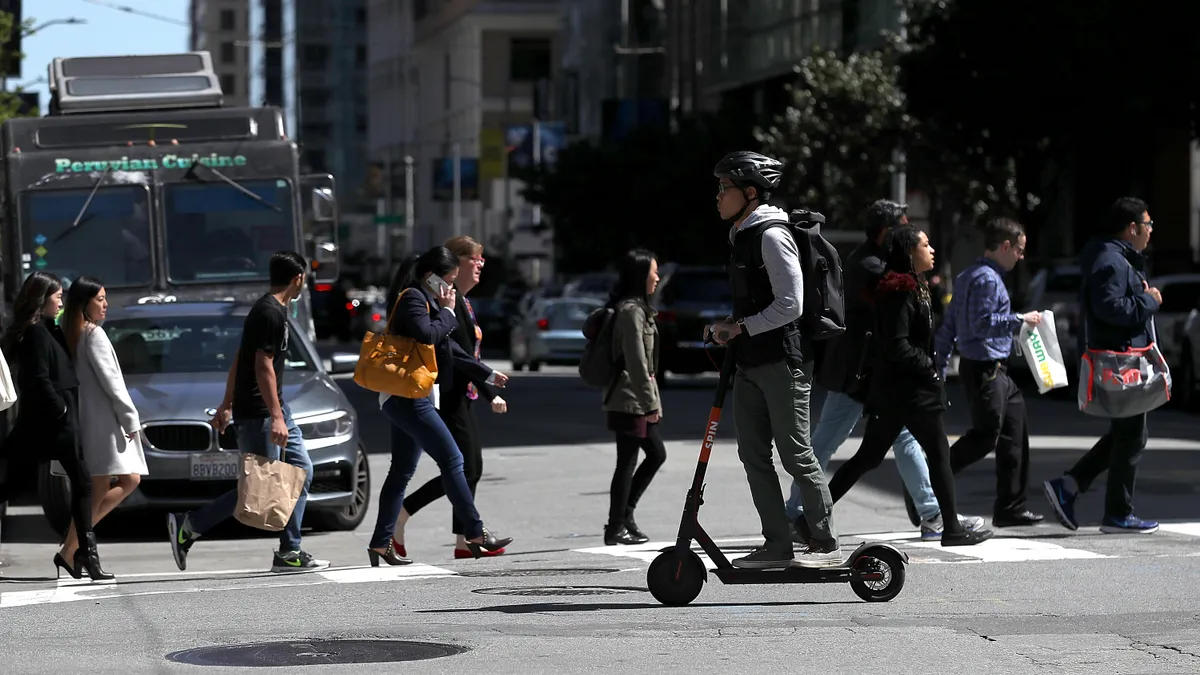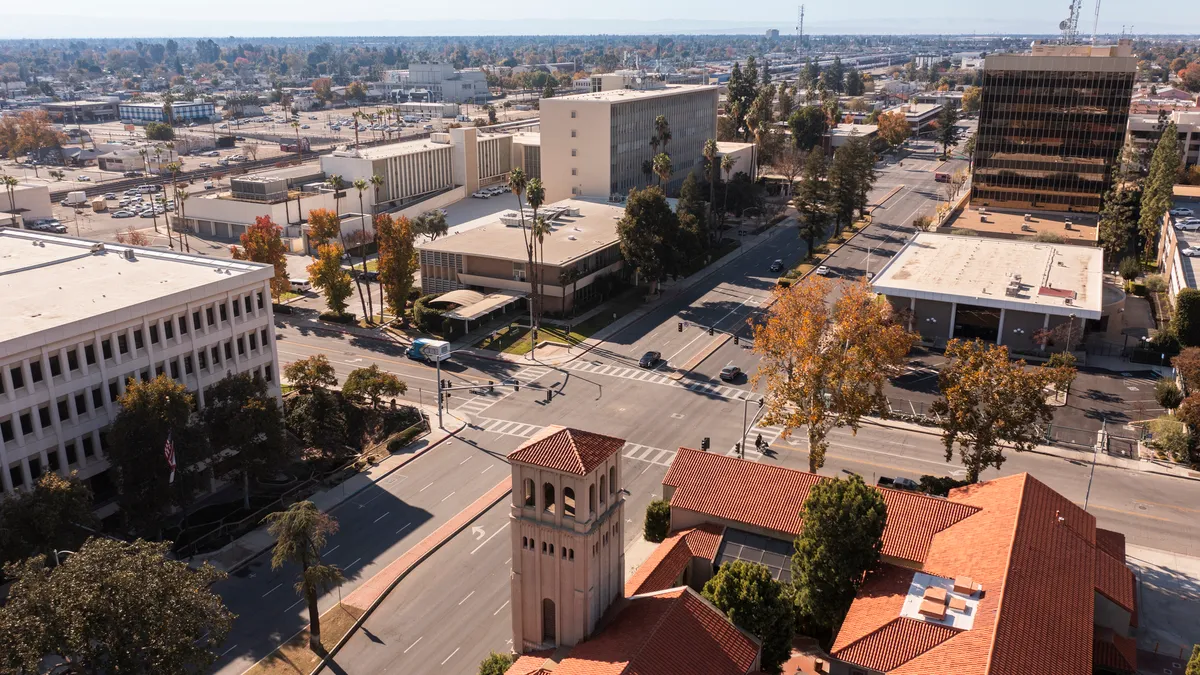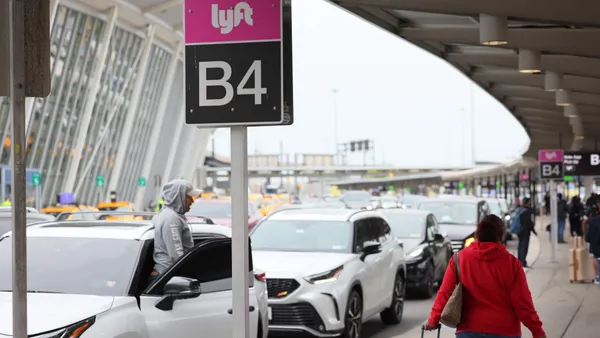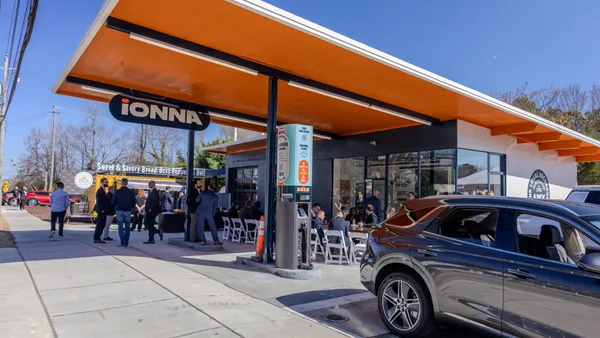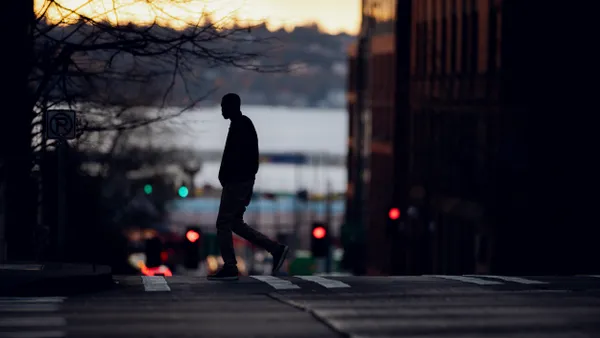Dive Brief:
- Advocates for safe and equitable walking infrastructure shared their experiences working for reforms to longstanding jaywalking laws during a virtual event hosted last week by America Walks, a national nonprofit focused on mobility justice.
- California, Massachusetts, Nevada and Virginia have each recently taken up this issue, with different aims and outcomes. Cities including Kansas City, Missouri, and Philadelphia have taken their own steps more locally to reduce inequities in how law enforcement intervene with pedestrians or other road users.
- Event speakers have had mixed success in their pursuits to decriminalize jaywalking. In one victory for change, the Kansas City City Council in May voted unanimously to eliminate tickets and penalties for jaywalking. Michael Kelley, executive director of BikeWalkKC, said the change was essential to the group's mission of creating a culture of active living because they "can't possibly push in that direction" if there are still barriers with "interventions on the street."
Dive Insight:
The discussion came as numerous states and municipalities weigh changes to how they approach jaywalking laws and safe walking.
Broadly speaking, people against softening laws note the already high number of incidents with vehicles striking pedestrians in roadways, and worry that lowering the consequences of jaywalking could worsen safety.
But proponents of reform describe jaywalking as a "made-up thing" by the auto industry to shift fault to pedestrians in cases when pedestrians are struck by a vehicle. Proponents also note that poor, working-class and people of color are frequently stopped, fined and brought into the law enforcement system for jaywalking at disproportionately high rates. LAist reported last month that over the last decade in Los Angeles, nearly one-third of pedestrians issued jaywalking tickets were Black, despite only 9% of the city's population being Black.
California Gov. Gavin Newsom vetoed a bill this month that would eliminate related fines or criminal penalties associated with jaywalking, citing the potential to “unintentionally reduce pedestrian safety and potentially increase fatalities or serious injuries caused by pedestrians that enter our roadways at inappropriate locations.” At the time, Newsom also wrote: "I strongly encourage local governments to conduct a review of the demographics and enforcement levels of jaywalking in their communities and to identify and address concerns at the local level as appropriate."
Caro Jauregui is co-executive director at California Walks, one of the groups that authored that bill. During the webinar, she stated in an initial response to the veto that it demonstrates "complicitness in state-imposed violence toward all pedestrians, but especially to the Black community."
Conversely, the state of Virginia recently passed a law making it harder to fine someone for jaywalking, which took effect in March. Jaywalking is still illegal, but individuals cannot be stopped by law enforcement solely due to that offense.
Meanwhile, Massachusetts is weighing a bill that would increase fines from $1 on the first three offenses and $2 thereafter to a $25-$50-$100 fine structure for the first three offenses, with the potential for much higher fines if the offender is wearing headphones or earbuds. It would also require pedestrians to be much closer to a crosswalk when crossing the street. Advocacy group WalkBoston has described the legislation that would make it illegal to cross outside of a crosswalk as "not realistic."
As for city-based efforts, Al Día News reported last week that a police district overseeing certain Northwest Philadelphia neighborhoods is piloting the elimination of police stops for low-level offenses, including jaywalking. Separately, in a bid to reduce transportation-related law enforcement interactions beyond jaywalking, the Philadelphia City Council recently approved legislation meant to "end the traffic stops that promote discrimination while keeping the traffic stops that promote public safety."



